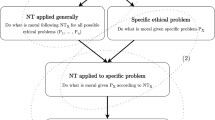Abstract
Modern logic is undergoing a cognitive turn, side-stepping Frege’s ‘antipsychologism’. Collaborations between logicians and colleagues in more empirical fields are growing, especially in research on reasoning and information update by intelligent agents. We place this border-crossing research in the context of long-standing contacts between logic and empirical facts, since pure normativity has never been a plausible stance. We also discuss what the fall of Frege’s Wall means for a new agenda of logic as a theory of rational agency, and what might then be a viable understanding of ‘psychologism’ as a friend rather than an enemy of logical theory.
Similar content being viewed by others
References
Baggio, Giosue, Michiel van Lambalgen, and Peter Hagoort, ‘Language, linguistics and cognition’, in Martin Stokhof and Jeroen Groenendijk, (eds.), Handbook of the Philosophy of Linguistics, Elsevier, Amsterdam, 2007. To appear.
Barwise Jon, John Etchemendy (1991) ‘Visual information and valid reasoning’. In: Walter Zimmermann, Steve Cunningham (eds). Visualization in Teaching and Learning Mathematics. Mathematical Association of America, Washington, DC, USA, pp. 9–24
Barwise Jon, John Perry (1983) Situations and attitudes. Bradford Books, Cambridge, MA
Bod Rens, Beyond Grammar (1998) An Experience-Based Theory of Language. CSLI Publications, Stanford
Castelfranchi, Cristiano, and Fabio Paglieri, ‘On the integration of goal dynamics and belief structures’, 2007. To appear in Synthese.
Dunin-Keplicz Barbara, Rineke Verbrugge (2002) ‘Collective intentions’. Fundamenta Informaticae 51(3): 271–295
Gabbay Dov, Franz Guenthner (eds), (1983-1999) Handbook of Philosophical Logic. Kluwer Academic Publishers, Dordrecht
Gabbay Dov, John Woods (eds). (2004) Handbook of Logic and Argumentation. Elsevier Science Publishers, Amsterdam
Geurts Bart (2003) ‘Reasoning with quantifiers’. Cognition 86(3):223–251
Gigerenzer Gerd, Peter M. Todd, A. B. C. Research Group (1999). Simple Heuristics That Make Us Smart. Oxford University Press, New York
Girotto, Vittorio, and Michel Gonzalez, ‘Young children’s intuitions about posterior probability’, 2005. Lecture at ESF ExploratoryWorkshop on Understanding the Dynamics of Knowledge, University of Siena.
Gopnik Alison, Clark Glymour, David M. Sobel, Laura E. Schulz, Tamar Kushnir, David Danks (2004) ‘A theory of causal learning in children: Causal maps and Bayes nets’. Psychological Review 111(1): 3–32
Haack Susan (1974) Deviant Logic: Some Philosophical Issues. Cambridge University Press, Cambridge
Hansen, Pelle, and Vincent F. Hendricks, (eds.), Five Questions on Game Theory, Automatic Press, Copenhagen, 2007. To appear.
Helmholtz Hermann (1878) The Facts of Perception. Wesleyan University Press, Middletown, Conn
Hodges Helen, Wilfrid Hodges, Johan van Benthem (2007) ‘Logic and psychology’. Topoi 26, 1–2
Kerdiles, Gwen, Saying it with Pictures, Ph.D. thesis, Institute for Logic, Language and Computation, University of Amsterdam, 2001.
Leitgeb Hannes, Gerhard Schurz (2005) ‘Non-monotonic and uncertain reasoning in cognition’. Synthese 146, 1–2
Liu, Fenrong, ‘Diversity of agents’, in Thomas Agotnes, and Natasha Alechina, (eds.), Proceedings of the Workshop on Logics for Resource-Bounded Agents, organised as part of the 18th European Summer School on Logic, Language and Information (ESSLLI) , Malaga, Spain, 2006, pp. 88–98.
Piaget Jean (1953) The Origins of Intelligence in Children. Routledge and Kegan Paul, London
Skyrms Brian (2004) The Stag Hunt and the Evolution of Social Structure. Cambridge University Press, Cambridge
Stenning Keith (2001) Seeing Reason: Image and Language in Learning to Think. Oxford University Press, Oxford
Stenning Keith, Michiel van Lambalgen (2007) Human Reasoning and Cognitive Science. The MIT Press, Cambridge, Mass
Tenenbaum Joshua B., Thomas L. Griffiths, Charles Kemp (2006) ‘Theorybased bayesian models of inductive learning and reasoning’. Trends in Cognitive Sciences 10(7): 309–318
Tentori Katya, Vincenzo Crupi, Nicolao Bonini, Daniel Osherson (2007) ‘Comparison of confirmation measures’. Cognition 103(1): 107–119
van Benthem Johan (1996) Exploring Logical Dynamics. CSLI Publications, Stanford, USA
van Benthem Johan (1999). ‘Wider still and wider: resetting the bounds of logic’. In: Achille Varzi (eds). The European Review of Philosophy. CSLI Publications, Stanford USA, pp, 21–44
van Benthem, Johan, ‘Open problems in logic and games.’, in Sergei N. Artёmov, Howard Barringer, Artur S. d’Avila Garcez, Luís C. Lamb, and John Woods, (eds.), We Will Show Them! Essays in Honour of Dov Gabbay, Volume One, King’s College Publications, London, UK, 2005, pp. 229–264. Available also on http://staff.science.uva.nl/~johan/.
van Benthem, Johan, ‘One is a lonely number: on the logic of communication’, in Zoe Chatzidakis, Peter Koepke, and Wolfram Pohlers, (eds.), Lecture Notes in Logic, Logic Colloquium 2002, vol. 27 of Lecture Notes in Logic, ASL & A. K. Peters, Wellesley, MA, 2006, pp. 96–129.
van Benthem, Johan, ’Logic, Rational Agency, and Intelligent Interaction’, invited lecture, 13th Congress of Logic, Methodology, and Philosophy of Science, Beijing, 2007. Proceedings to appear with College Publications, London, Dag Westerstahl et al., (eds.).
van Benthem Johan, Alice ter Meulen (eds), (1997) Handbook of Logic and Language. Elsevier Science Publishers, Amsterdam
van Ditmarsch Hans, Wiebe van der Hoek, Barteld Kooi (2007) Dynamic-Epistemic Logic. Springer, Dordrecht
van Lambalgen Michiel, Fritz Hamm (2004) The Proper Treatment of Events. Blackwell Publishers, Oxford
Veltman, Frank, ‘Een zogenaamde denkfout’, Institute for Logic, Language and Computation, University of Amsterdam, 2001.
Wason Peter, Philip Nicholas Johnson-Laird (1972) The Psychology of Reasoning: Structure and Content. Harvard University Press, Cambridge, Mass
Author information
Authors and Affiliations
Corresponding author
Additional information
Edited by Hannes Leitgeb
Rights and permissions
About this article
Cite this article
van Benthem, J. Logic and Reasoning: do the facts matter?. Stud Logica 88, 67–84 (2008). https://doi.org/10.1007/s11225-008-9101-1
Published:
Issue Date:
DOI: https://doi.org/10.1007/s11225-008-9101-1




